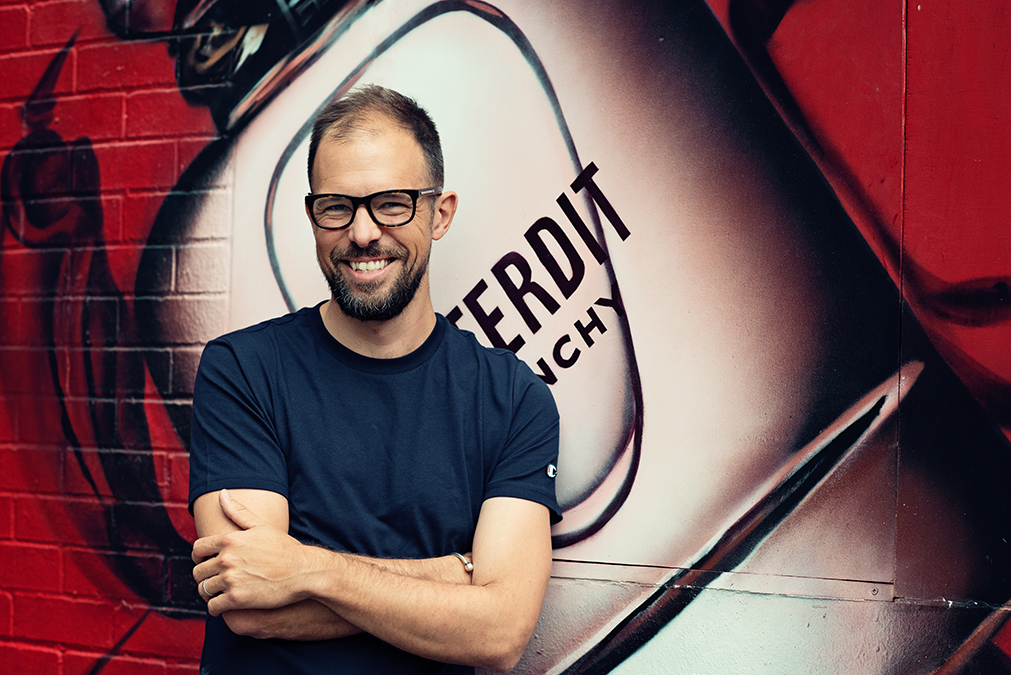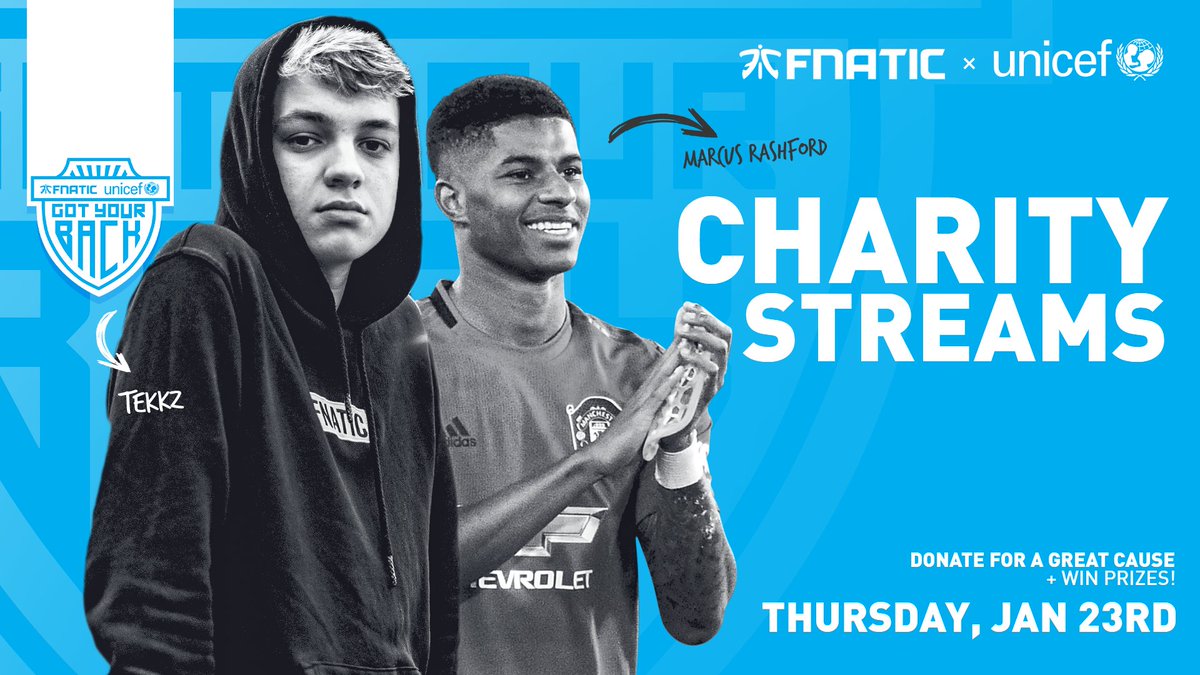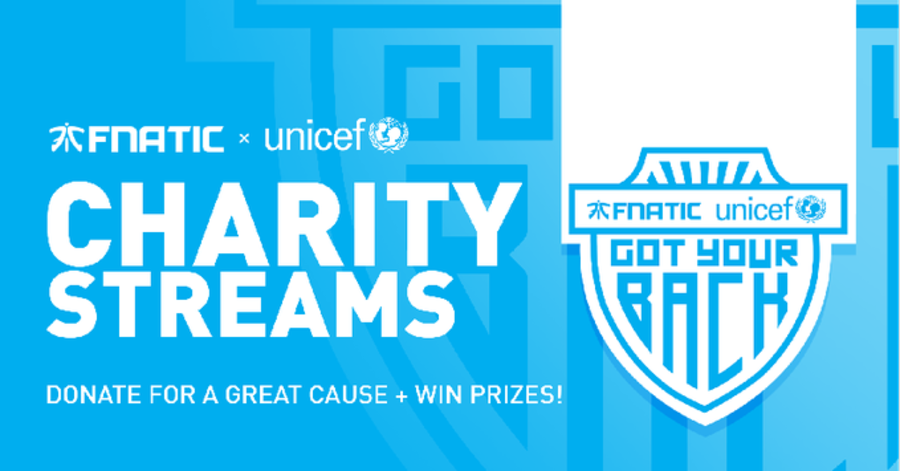London-based esports giant Fnatic made headlines earlier this year when it announced a partnership with international children’s charity UNICEF.
The pair kicked off their partnership with the #GotYourBack campaign, which has already seen Fnatic’s FIFA pro Tekkz team up with Manchester United star Marcus Rashford to raise over £4,350 during a fundraising stream.
We caught up with Andrew Cooke, Head Counsel at Fnatic, to delve deeper into the thinking process behind the partnership and find out what might be coming next.

Esports Insider: How has the campaign been going so far?
Andrew Cooke: The UNICEF campaign has been impactful in lots of ways. When UNICEF came to us to talk about getting involved in esports and starting to understand this space, initially it was a pretty small conversation: “Okay, let’s get your players to jump online with our celebrities, and see how we can make some money.” And I suppose, at its core, that’s really what it is: it’s awareness-raising for UNICEF, it’s raising money for UNICEF; those are very good and valid goals, and we’re happy to support them.
But I think, as we continued the conversation, it’s grown into something with the potential to be a little bit more than that. As an organisation, Fnatic has the benefit of having 15 years’ experience in the industry, which is pretty unusual; [we have] resources to tackle these kinds of things. And UNICEF has supported your Manchester Uniteds and your Barcelonas, and interacted with them, and what they’ve done together… When you align yourself with UNICEF, they don’t just go, “Yeah, okay, sign there, thanks very much.” Their expectations of their partners are that you meet a certain standard, in terms of understanding a duty of care towards players, how you make sure that children are protected when they interact with your organisation, all those kinds of things. And then you start to think about what that means for esports.
I think this is just about, for us, that toxic environment that most people in gaming have experienced; just taking beef off people online. If that is a reason that people don’t play games, because they look at it and they say, “We just don’t want any part of this,” that’s a problem for us. We want as many people to be playing games and enjoying their experiences as they can, having fun when they’re gaming.
That, for me, is just the positive goal outright. Never mind getting into the more complicated elements of it. We’re not here to solve the problem of toxicity online. We’re not here to solve problem of how people talk to each other on social media. That’s not the goal here… Basically, just to create a fun experience for people and make sure that as many people as possible are enjoying gaming: that’s the goal.
ESI: You seem to have two targets: one is targeting toxicity, and the other is fundraising for the specific campaigns that UNICEF is running. Do you want to just talk to me a little bit about those two goals, and where you see them going?
AC: I don’t want to be too coy with you, but there will be announcements coming up over the course of what we hope will be a pretty long-term partnership.
I think for UNICEF, it’s about dipping their toes in the water. This is not an environment they’ve worked in before. They’re used to working with much bigger organisations. Manchester United is a huge commercial operation. Barcelona is a huge commercial operation. This is their first step into esports. But a lot of the guys there are passionate about esports, passionate about Fnatic particularly, because we work with UNICEF UK and a lot of their guys are living here in London and see Fnatic as being a standard-bearer for the UK, connecting with the brand in that sense. So, we saw a lot of passion from them when they came to us to talk about it.
“Because if an organisation like Fnatic, which again has our history, has our resources, can’t start to tackle these things that may be preventing people from doing what we love to do, then who’s going to do it?”
I don’t think it would have been possible for us to have to have the scope of the conversation that we’ve had without them having met Fnatic at the right point in its development. How we are in terms of where we resource, where we are, where we’re playing, and how we built out our back office in the last year. Those kinds of things are all big maturity steps for Fnatic. I think it’s enabled us to start to rethink about who we are as an organisation and what we want to do with this. Because if an organisation like Fnatic, which again has our history and our resources, can’t start to tackle these things that may be preventing people from doing what we love to do, then who’s going to do it?
This is about protecting children and the power of play. UKIE, the government body that’s responsible for the gaming industry in terms of entertainment, they have their Smart Play piece [Get Smart About P.L.A.Y.], which I think is going in the same direction, but fundamentally, the teams and the players themselves need to take that step as well.
RELATED: Fnatic announces charitable partnership with UNICEF
This is not small beer stuff, now, do you know what I mean? This is not people just “doing their best;” our pros, the way in which they show up to the games now – you’ve seen this development yourself if you’ve been in the industry – it’s not that they each have a pack of crisps and then go up on stage. There are nutritionists, there are mental coaches, right? There are physios; our pro kit is designed with how the pros are actually sitting and playing. You know, we’re looking at physiology, we’re looking at all these different elements of how they approach the game.
So, if we’re asking them to take that accountability for them to show up and to be, to an extent, role models to fans, we as an organisation have to take on that accountability ourselves. I think that’s appropriate for where we are in our journey. And I’m not saying to other teams that they have to follow [us in] the way they do it, you know. Each team can do whatever it wants! But I do think it’s right that we take these steps and move these issues forward.

ESI: Esports, for years, has had a growing viewership, especially among the younger demographic. You’re obviously one of the largest brands in the regions that you operate in, do you believe that there is a responsibility on you guys to be that positive force on the community?
AC: That’s an interesting question. You’re talking to a lawyer, right? So, how does that responsibility manifest itself?
Our social media guys said that there’s a danger in the esports community, generally speaking, that the core fans have a view on how authentic it is when esports teams like ours tackle some, what you might call, “social issues”, right? You’ve got to be pretty careful how you place that. When you talk about responsibility, I’m also uncomfortable with the idea that sports teams or entertainment brands have a responsibility to tackle issues which are societal. I went to a football match the other week and people in the stands weren’t being very nice to some of the people on the pitch. That has existed since before we had social media, it’s been exacerbated by social media. We’re not here to solve that.
To anybody who’s cynical about the motivations, I would say there’s a solid commercial reason to do this. Fundamentally, we’re trying to work in multiple regions. One of the things that’s unique about Fnatic is that we have positioning in North America, Europe, and Asia. We want for it to be very easy for people to connect with our brand, for there to be no barriers to them doing that. And that’s about great apparel and cool aesthetic but it’s also about things like this, a reason why somebody might not want to pick up a keyboard or controller or a phone, and move away from that stuff.
“As Spider-Man’s told us, with great power comes great responsibility and you know, you gotta use that positively.”
Even in something like mobile gaming, if you look at our PUBG team in India and the success that they’re having and how they’re building a movement there, but through this thing which everybody has access to… it democratizes the whole thing. We’re constantly having other teams get in touch with us and talk about how we launched in India, “Can we do things with you there?”, all that sort of stuff. So, to an extent, you have front-runners on this kind of stuff. For us, it’s growing that industry, growing the base of it. There are obvious commercial benefits for us doing that. So, if you’re cynical about why we might be doing this, then I would say there are great commercial, community-building reasons for doing this – putting aside the fantastic upsides of raising money for UNICEF.
RELATED: Fnatic hires Nimish Raut to lead efforts in India
Drawing attention to these issues and ticking off that point that esports is now mature enough to say, “Okay, we don’t have to talk about what’s amazing about what it is that we do all the time.” We can also say, “Look, there’s some things here that we should be working on together to try and change.” That’s a good thing, right? That’s a level of self-awareness, but also understanding that we have influence. The guys who play for us, these guys who are on the verge of celebrity and influence – someone like Tekkz, that kind of burgeoning social awareness within him – it’s not just about making money all the time, it’s also about using that power for good.
But as Spider-Man’s told us, with great power comes great responsibility and you know, you gotta use that positively. My view is if you do that, then good things will result. Because other brands, other people, other players will see you as an organisation that’s coming into these things in good faith.

RELATED: Fnatic announces charitable partnership with UNICEF
ESI: So, we just mentioned the stream with Tekkz. Can you give us any heads-up on what other content or streams we can expect as part of the #GotYourBack campaign?
AC: Well, the full range of Fnatic’s talent is going to be involved. There’s going to be other celebrities coming in from the UNICEF side. There’s going to be other streams coming in from Fnatic. I think it’s just about an evolution of that relationship, right?
The nature of the relationship is UNICEF really dipping its toe into the market, working with the best to try and get the best outcome. I think we’ll both see how it goes. We’ll both do some more exciting stuff, I certainly hope, and who knows where it could go. UNICEF is a global organisation, we’re a global outfit, I can see us working together in other countries trying to exchange best practice. I know that some of my colleagues are working very closely with UNICEF’s safeguarding team on developing that part of it.
There could be some great stuff that comes out of that that may not necessarily be “fun for fans” in the way that Tekkz playing FIFA on stream is fun for fans. If fans would want to take an interest in it: ask questions to the teams that they support (if it’s not us), “How are you tackling these things, how are you driving these things forward?” I think it’s time to have that conversation as an industry.
ESI: Obviously, charity as a cause transcends both football and gaming, but were there any United fans in the office that got a particular kick out of working with Rashford?
AC: It’s funny… Tekkz, he’s pretty closely aligned with Liverpool and I noticed on the stream that a few people were giving him some grief about that!
I mean, Fnatic is such an international business, right? I’m looking out the window and in my eye line, I’ve got a French guy, South African guy, a Portuguese person. It’s so international.
“Gaming is this force that brings us all together, which is why it’s all the more important that we tackle the things that we don’t like so much about it so that everybody can have that experience.”
I would say that is what Rashford represents. I don’t want to get too high concept about it, but Rashford represents something which is more than just a Man United player. He’s an England player. He’s somebody who has the ability to play for national team for many years. He’s also somebody who has shown a willingness to tackle some issues in social media for himself, that obviously affected him very heavily in his life.
We felt it was somebody who is emblematic of loads values that we want people to be able to ascribe to Fnatic. We are young, we are the future, we are involved online, we are mature enough to tackle these issues, all that sort of thing. So it was less, for us, about Manchester United, and a lot more about Marcus Rashford and what he’s bringing from that standpoint. And the other celebrities we’ll be working with probably fit that sort of profile.
I think that’s probably the template for how these things would work in the future: young, connected people who have this kind of social conscious but also want to get engaged in these movements. You know, gaming provides a platform for them to connect in a way that music and other forms of entertainment don’t, because they don’t have that interactive element, right? And where we at Fnatic think the industry is going is that point of connection. Gaming is this force that brings us all together, which is why it’s all the more important that we tackle the things that we don’t like so much about it so that everybody can have that experience.
If someone like Marcus Rashford, who’s had the challenges that he’s had online, still sees this as a place where he can come together with his brothers and with Tekkz and with people from Fnatic and they all have fun, that’s a great thing. Fnatic will always try and work with people who want to approach gaming in that positive way.
[maxbutton id=”4″ ]
